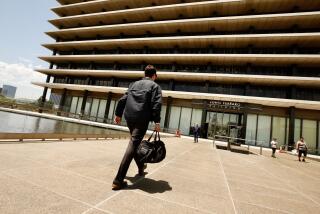City Employee Unions Do Battle to Represent Blue-Collar Contingent
Two unions representing San Diego city employees are engaged in a bitter dispute over rights to represent about 1,700 blue-collar workers, and a lawsuit filed in the case could lead to the breakup of one union while giving the other exclusive rights to represent a majority of the city’s 8,000 employees.
According to the lawsuit filed in Superior Court by the Municipal Employees Assn., the labor group has obtained signature cards from a significant number of AFSCME Local 127 members to decertify the local and have the MEA represent them.
The MEA represents about 3,500 white-collar employees, while the American Federation of State, County and Municipal Employees Local 127, AFL-CIO, represents the approximately 1,700 blue-collar workers. The MEA has represented city workers in San Diego for about 60 years, while Local 127 has been a bargaining agent in the city for 50.
MEA President Judy Richards said the association’s organizers collected the signed cards between August and January from Local 127 members, who complained that their union was giving them inadequate representation. In January, the MEA unsuccessfully petitioned the city manager to allow an election by Local 127 members to decertify the local and designate the MEA as their bargaining agent.
Contracts Extended
The MEA wants to negotiate future contracts for the blue-collar workers, whose contract with the city was due to expire June 30. Under an agreement between the unions and the City Council, decertification elections cannot take place until six months before the expiration of a contract.
However, last year the city negotiated a one-year extension of the contracts it had with Local 127 and the unions representing police and fire employees. The MEA rejected the extension because of a dispute over retirement benefits. As a result, the other three unions received a 5% wage increase effective at the end of their contracts, and the MEA will begin negotiations Friday on a new contract.
On Feb. 8, Bruce Herring, a labor relations manager in the city manager’s office, rejected the MEA petition for the decertification election. Herring argued that the contract extension negotiated with Local 127 put the new agreement’s expiration date at June 30, 1989, in effect barring an election until next January.
The City Council upheld Herring’s position by 7-2 on Feb. 29.
Attorneys for the MEA then sued the city, charging that the council was in collusion with Local 127 and had negotiated a “sweetheart” contract with the union. The lawsuit, which will be heard April 18, asks the court to order the council to permit the decertification election this year.
City Protection Alleged
Such an election requires signature cards from at least 30% of Local 127’s membership; a majority of the local would then have to approve the MEA as its bargaining agent before it could be recognized by the city manager’s office.
“We’ve always been a more aggressive group and work harder to represent our members,” said Richards. “The city is aware of this, so it doesn’t surprise us that it is protecting Local 127. It’s to their advantage to have Local 127 representing the blue-collar employees.”
Richards said the local’s leadership has been weak and ineffective for years and that city officials have told her they “basically watch out” for Local 127’s interests during contract negotiations.
“They tell us that the local’s leadership is not very sophisticated,” Richards said.
Rumors of Demise Called Unfair
Dave Miller, an AFSCME spokesman in Los Angeles, said MEA officials are spreading unfair rumors about Local 127’s inability to represent its members.
Miller said that “word about the demise of the local is definitely premature.” The AFSCME is in the middle of an aggressive registration drive in San Diego and signed 20 new members last week, he added. Membership in public employee unions is voluntary.
Guido DeRienza, an AFSCME organizer from Los Angeles, is in San Diego helping to recruit new members. DeRienza said Local 127 agreed to the contract extension because the city offered a wage increase that is higher than that negotiated by the AFSCME in other cities and municipalities.
“The average that has been negotiated in public-sector contracts has been about 2% to 4% nationwide. . . . With the benefits we negotiated in San Diego, the increase was more than 5% when you factor in the benefits,” DeRienza said.
Chose Increase Over Gamble
Union studies also show that state and local governments have lost more than $6.4 billion in revenues in recent years because of federal cutbacks, DeRienza said.
“We figured it would be to our advantage to take a 5% increase now than to gamble later with a diminishing of the city’s revenue base,” he said.
According to DeRienza, during the negotiations for the contract extension, Local 127 representatives were told by city officials that they were anticipating a $60 million revenue loss in the coming years.
In the MEA lawsuit, the association charges that the city’s refusal to allow the decertification election to proceed violates workers’ rights because it prevents them from changing bargaining agents “for an indefinite period of time.”
The suit charges that the city and Local 127 agreed to the contract extension to block the MEA’s attempt to represent the blue-collar workers.
More to Read
Sign up for Essential California
The most important California stories and recommendations in your inbox every morning.
You may occasionally receive promotional content from the Los Angeles Times.










